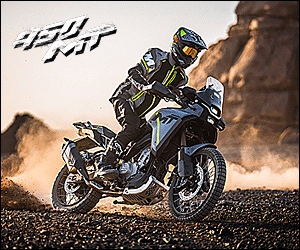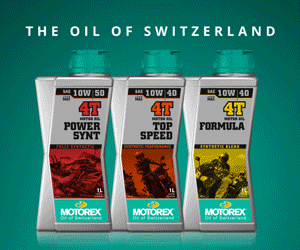Around the world with The Bear – Part 12
The King of Every Kingdom
Around the world on a very small motorcycle
With J. Peter “The Bear” Thoeming
Previous Episode: Looking for a hotel in Afghanistan? Ask the police, and they’ll put you up for the night. At a price… The adventure continues with The Bear heading from Afghanistan into Iran and on to Turkey.
After a night in the hotel-cum-police station at Kelat (we couldn’t work out which it was, and it was probably both) as paying guests of the national police we made Kandahar without further incident. Except for the Attack of the Suicide Sheep, that is.
For some reason best known to themselves, a mob of these stupid animals tried to throw themselves under our wheels. This happened to me once in Scotland, too. Maybe it’s me. After a break in the appropriately named Peace Hotel in Kandahar we were ready for the 1000km Dasht-i-Dargo, the Desert of Death.
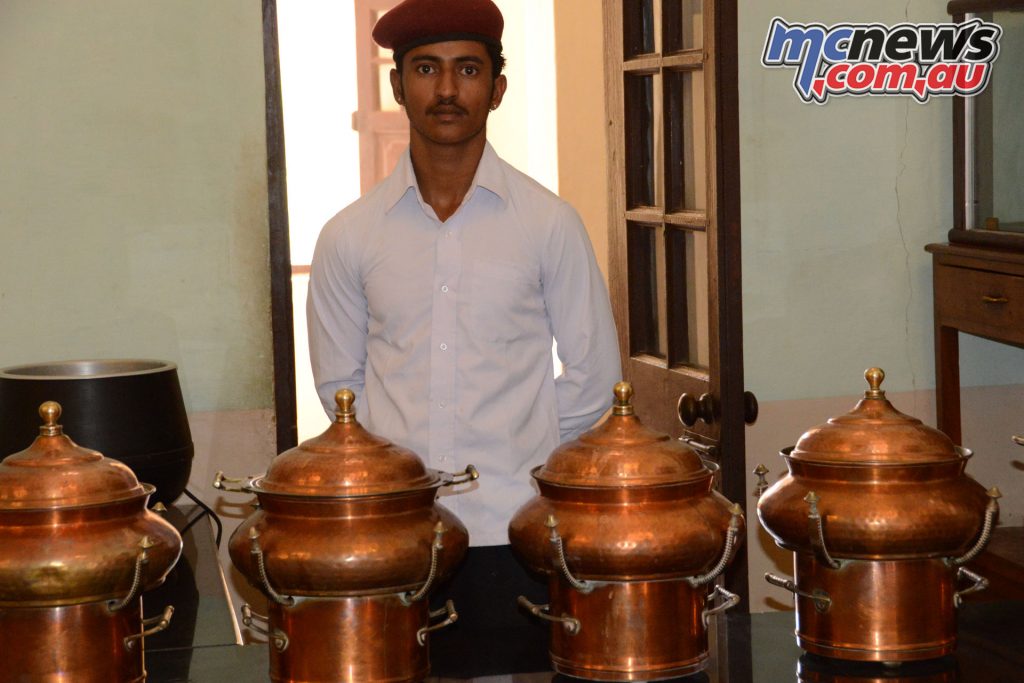
Along the way we stopped for a swim in the Farrah River, the only body of water between Kandahar and Herat. When we took the bikes down the river bank, a Desert of Death thorn lodged in Charlie’s back tyre. When we were back in the mountains, it worked its way to the tube and caused a flat.
We drank something like five litres of water each (the total contents of our water canisters) in the time it took to fix the first and then the second flat, which we caused when we disturbed an old patch. It was hot; in fact, it felt hotter than the 52 degrees we’d experienced in India. The only shade was inside a drain under the road, so that’s where we did our repairs. I can see why they call it the Desert of Death.
Herat is an impressive town, with a more or less ruined fort in the middle and lots of other ruins around, as well as large, dusty but green parks. The electricity in Herat was a bit … thin, I suppose. An American chap we met had been using a 110-volt shaver in the allegedly 240-volt sockets without trouble.
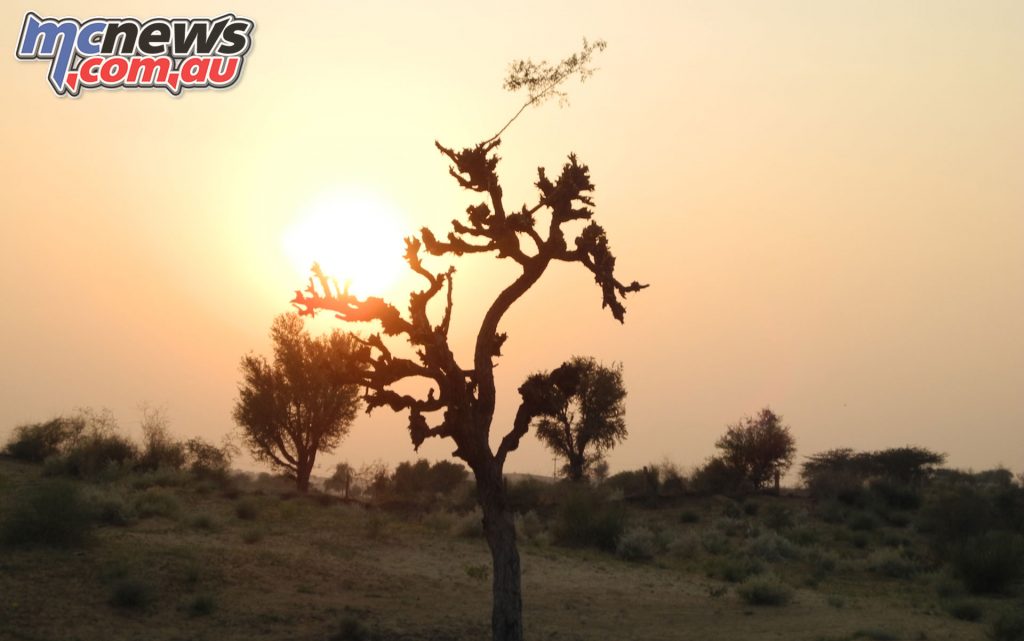
The electricity wasn’t the only thin thing in Herat. Our patience ran a bit thin, too, as we rushed around from one government office to the next trying to pay our fine for overstaying and getting exit permission.
The border was easy in comparison. We had been warned of people hiding drugs on our bikes and then reporting us, so we stopped short of the border and searched the bikes ourselves. Nothing. At the Afghani border post they didn’t even search us.
Iran
The Iranians were a little keener. They seemed set to give us the sort of thorough going over a Land Rover was getting in the next parking bay. But then, when they brought out their bit of bent wire to probe the insides of our petrol tanks, I pointed out that they didn’t need it. The plastic tanks were translucent and they could see that there was nothing inside. That impressed them so much they let us go on the spot. We left them prizing the lining out of the Land-Rover.
 We made it to the holy city of Mashad’s campsite and sat down to calm our nerves with a beer, our first encounter with Iranian drivers behind us. Iranians, I’m sorry to say, are the worst drivers in the world, or perhaps just the most fearless; even more than the Afghanis.
We made it to the holy city of Mashad’s campsite and sat down to calm our nerves with a beer, our first encounter with Iranian drivers behind us. Iranians, I’m sorry to say, are the worst drivers in the world, or perhaps just the most fearless; even more than the Afghanis.
They think nothing of pulling out to overtake a bus that’s passing a truck that’s passing another bus—on a blind corner. They are also unfamiliar with the use of the gears, or perhaps consider changing down an attack on their manhood.
On flat roads, they drive in top gear with the accelerator flat to the boards and they don’t change down for hills. As a result they were passing us on the flat and we were passing them as they were wheezing up the hills. This brought out the homicidal maniac in them, since it is apparently a deadly insult to pass a car on a bike.
They would chase us and run us off the road. Consequently, we spent a great deal of time in the dirt, getting up the nerve to go back onto the tar. Every police station has a stone plinth outside with a particularly badly mangled car on it still bearing the blood stains of its collision, presumably as a warning. Nobody appears to take any notice.
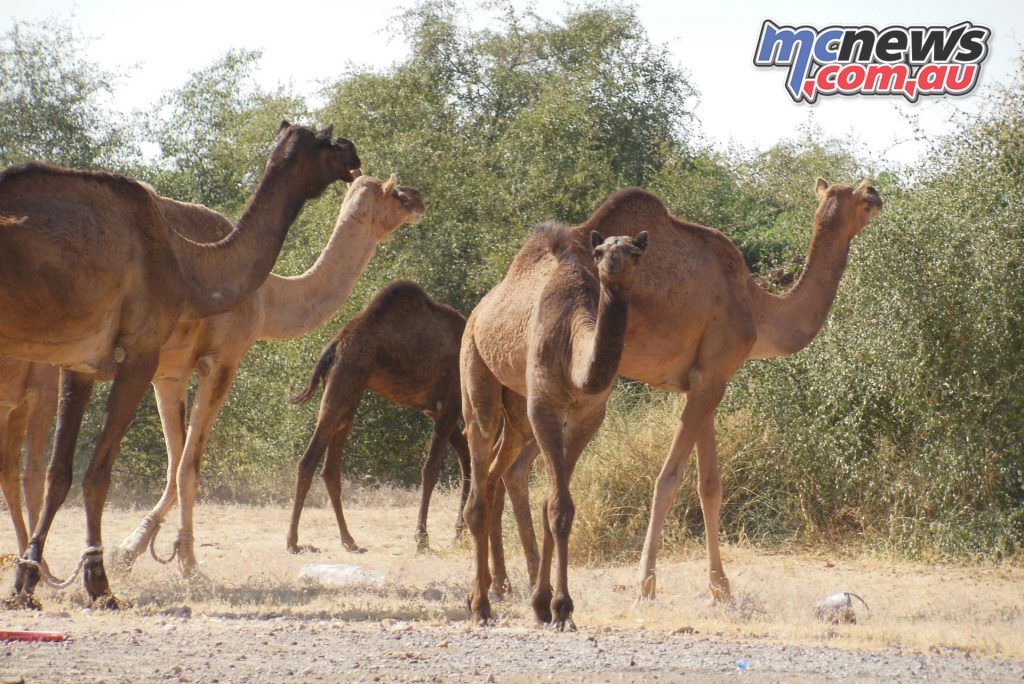
Very carefully we rode up to the Caspian Sea and then back down through a deep defile and over a stunning pass to Tehran. In the evenings we camped with all the locals in the parks every town has on its outskirts, apparently solely for this purpose. The people who had been trying to kill us all day couldn’t have been nicer; they helped us to find water, offered us tea and melon slices and gave us cigarettes. Then, the next morning, they went back to trying to kill us on the road.
Tehran traffic is so bad that we didn’t even try to cope with it—we took the minibus to town from our campsite, the famous Gol-e-Sahra. Charlie managed to find some XL spares, including a new speedometer cable for mine. We also did some maintenance work. Then we decided to skip our planned excursion down to Esfahan – to be perfectly honest, I just refused to go – and headed straight for the border.
Our last camp in Iran was at Maku, behind the Maku Inn. It sticks in my mind because I managed to find some proper bread, thick and moist, a great treat after the dry stuff most Iranians eat. Once again people were most helpful and very friendly. I have nothing against the people in Iran—as long as they’re not behind the wheel of a car.
At Maku we also met a couple of Swiss guys on XT500s fitted with 31-litre tanks. They were going to tackle the middle road through Afghanistan, which not only has no petrol stations but no road either. Alles gute, Jungs.
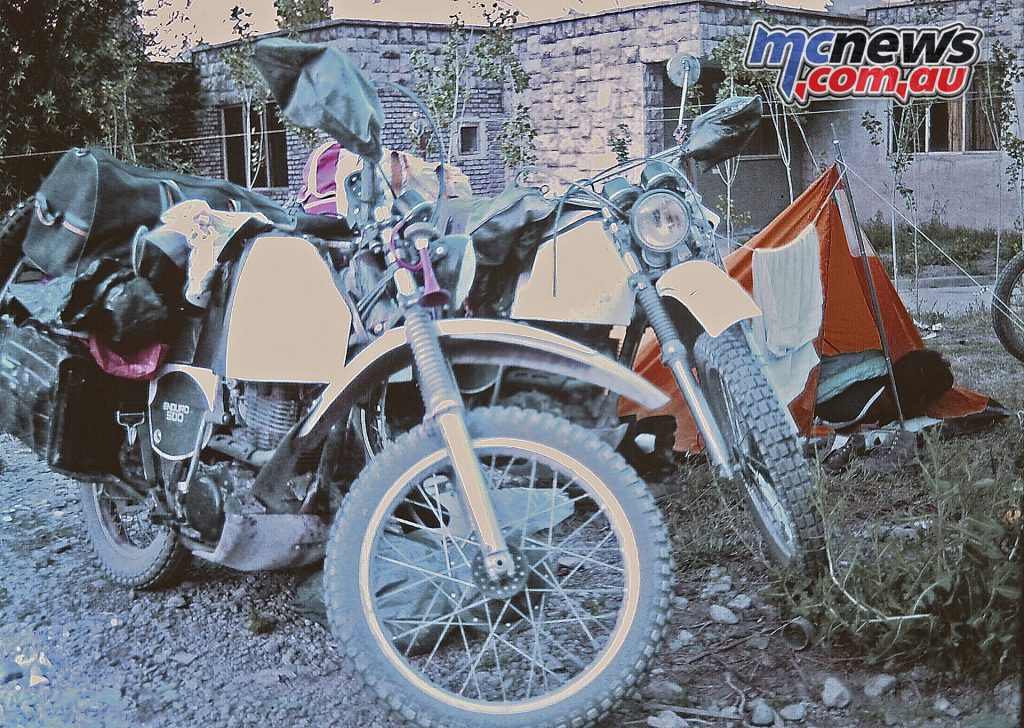
At the border, we buzzed past the enormous queue of TIR semitrailers waiting to be processed and got through the Iran side quickly and easily. Then we had to wait. There’s a two-hour time change at the border and on the Turkish side it was not yet business hours.
While we were waiting we chatted to the people going the other way, who were mostly Germans going to jobs in Iran. They gave us helpful advice as well as a couple of gallons of petrol and a map of Turkey. There are so many nice people out there.
Turkey
Once the border opened, we asked about insurance and were told that, yes, we had to have it. But the nearest place it was available was Erzurum, 200km to the west. Mmm. We rode off without it and nobody cared.
 At Dogubayazit—the locals call it ’Hozit, with rare good sense—we turned off the Asian Highway and headed up towards Kars. Although infested with cigarette cadgers and slightly longer, this road avoids the pass and the stretch of dirt road at Agri.
At Dogubayazit—the locals call it ’Hozit, with rare good sense—we turned off the Asian Highway and headed up towards Kars. Although infested with cigarette cadgers and slightly longer, this road avoids the pass and the stretch of dirt road at Agri.
The road wasn’t bad at all despite a lot of gravel stretches and we spent the night at the rather nasty Pasinler Inn. Charlie was feeling unwell and went off to bed, and I had a major battle with the desk trying to change a traveller’s cheque. Once they realized they wouldn’t get paid if they didn’t cash it, it was no problem.
Erzurum looked grim, and we didn’t bother stopping for insurance.
It was exhausting getting to Trabzon on the Black Sea. The road was a fine example of the Turkish ‘too hard’ syndrome. Wherever it ran over flat country it was tarred and in good repair; as soon as it approached one of the three passes and went up into the mountains it turned to dirt and deteriorated alarmingly. My theory is that it’s easy to lay and fix flat roads, but mountains are too hard.
Lunch was at a little lokanta (bar or pub) in the hills, and a truck driver who had worked in Germany for a while, like so many of his countrymen, and spoke the language warned us about the other locals. ‘The Turks can’t drive, and they’re crazy,’ he said. They’re not as bad as Iranians, Mustafa.
Would the blatant refusal to buy insurance cause us problems in this rugged country? Check next week.








